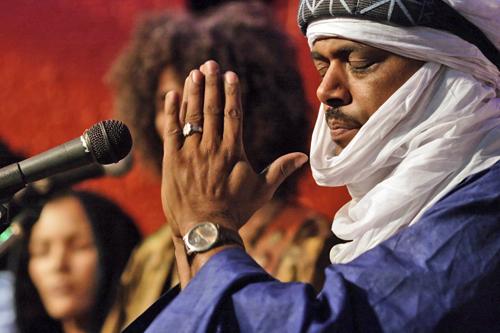Rock stars, rebels and the desert: Mali band takes nomad plight on world tour

October 18, 2007
DAKAR, Senegal – In the world of rock ‘n’ roll, it’s always cool to be a rebel. The guitar-toting, ex-guerilla fighters of one band aren’t pretending.
Formed in exile in Algeria, trained in Libyan military camps, tested on the battlefield, the Malian group Tinariwen has championed the plight of Mali’s fierce desert nomads for decades with an electric array of hypnotic poet-warrior blues rooted in their own homegrown Tuareg twang.
Once distributed hand to hand on cassette tapes banned by the government – British band manager Andy Morgan called it the “ghetto-blaster grapevine” – their music galvanized a disaffected generation and bound together a scattered culture without newspapers, radio or television stations in their native Tamashek language.
These days, the turbaned musicians straight out of the Sahara are touring the likes of New York, Paris and Tokyo to promote their latest CD, “Aman Iman: Water is Life” – 12 tracks of 1960s-style wah-wah-pedal guitar riffs, driving African drum beats and hand-clapped Arabic rhythms laced with lyrics that navigate the epic river of modern-day Tuareg existence.
Many of the tunes were written years ago, before the latest rebellions plaguing Mali and uranium-rich Niger sprung up this year and last. But as singer and guitarist Abdallah Ag Alhousseyni said in a recent interview in Dakar, the song remains the same.
Get The Daily Illini in your inbox!
“The problems of Tuaregs in Mali and Niger have never been solved,” Alhousseyni said as several band members lay on a mat on the floor of their modest hotel room, heating Chinese tea on a miniature charcoal grill.
“Young Tuaregs are up in the mountains with arms,” Alhousseyni said. “They want peace, but not only that. To come down, they want to see development.”
Tinariwen – meaning “deserts” or “empty places” – was founded in 1979 in Tamanrasset, southern Algeria, where band members-to-be were living a hand-to-mouth existence in the wake of Mali’s 1963 rebellion and the severe droughts that followed a decade later.
Among them was Ibrahim Ag Alhabib, the tall, charismatic, shaggy-haired lead singer-guitarist who co-founded the group. Malian forces killed Alhabib’s father and slaughtered his family’s camels and cattle when he was four, inducing a wandering life that included jail time and plenty of downtime among masses of exiled, unemployed youth longing for home.
According to Morgan’s account, Alhabib learned to play “on self-made bush guitars, which consisted mostly of a jerry can, a stick and some bicycle brake wire.”
It was a school of hard knocks that few Western musicians could imagine.
Drawn into Libyan leader Moammar Gadhafi’s training camps in the 1980s, the rockers practiced between military exercises. Eventually, six of them went on to fight in Mali’s rebellion, which lasted from 1990 to 1996. Four ex-fighters remain in the dozen-strong band.
One oft-told tale has former guitarist Kheddou Ag Ossad heading into battle with a Fender Stratocaster strung over one shoulder and a Kalashnikov rifle over the other. He was shot 17 times – and survived, so the legend goes.
True or not, such stories have bolstered Tinariwen’s mythical status. The group, though, plays down that past and no longer advocates violence.
“The idea that you can achieve your goals with arms is outdated. It’s not worth it,” said Hassan Ag Touhami, a mustachioed singer-guitarist-vibemaster. His own generation’s rebellion “was never a good idea,” he said, “but sometimes there are obligations.”
Tinariwen’s audience began going global after they performed at Mali’s 2001 Festival in the Desert, an annual Woodstock-like series of concerts that draws blue-turbaned nomads on camelback and foreign tourists under the stars.
Their first album, “The Radio Tisdas Sessions,” was released the same year and followed by the 2004 world music hit, “Amassakoul,” meaning “traveler.”
Since then, Tinariwen has performed with rock legends Santana and Led Zeppelin’s Robert Plant, whose guitarist, Justin Adams, produced Aman Iman.
The tracks on their latest work feature the group’s signature offensive of six guitars, which lay the backdrop for poetic vocals expounding on exile, love, longing, war and the desert.
Many of the tunes begin with slow, lingering solo guitar preludes that meld into trancelike traditional beats invoking Berber and Moroccan influences. Mesmerizing male chants are topped off with a pair of sweet-voiced female crooners that occasionally let loose quivering guttural tongue cries.
On “Mano Dayak,” Alhousseyni sings of the 21st century’s subtle intrusion into the shadeless desert, recounting his amazement upon seeing a Tuareg talking on a satellite telephone “tied to a tree.”
What has fueled Tuareg unrest is what lacks in their lands today, Alhousseyni said: the basics of modern civilization. “No development, no schools, no water, no teachers,” he said. “It’s a forgotten world.”






